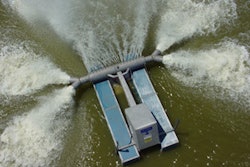LAS CRUCES, N.M. (AP) — A Colorado-based horse advocacy group says a New Mexico company seeking to become the nation's first slaughterhouse for horses since 2007 should face fines for violating laws on waste disposal.
The Albuquerque Journal reports that the state Environment Department received a letter this week from Front Range Equine Rescue calling for fines against Valley Meat Co. The Roswell-area slaughterhouse has hauled 400 tons of composted cattle parts from its property, after two years of prodding by the state Environment Department.
But Front Range Equine Rescue said the company should still be fined for past offenses highlighted by a USDA inspector in January 2010.
Fines can reach $5,000 daily per violation, so Valley Meat could be subject to millions in fines. However, Auralie Ashley-Marx, chief of the Environment Department's Solid Waste Bureau, said Friday that there are mitigating circumstances, such as the recent removal of the waste and the lack of a market for De Los Santos' compost.
"This is not a black and white case," she said. "Sometimes there are limiting factors that are difficult to overcome."
Valley Meat Co. officials could not be reached for comment.
The firm, owned by Rick De Los Santos, burst into the public spotlight after it filed an inspection application with the USDA in March in a bid to slaughter horses for human consumption in foreign markets.
No rendering plants have slaughtered horses in the United States since 2006, when Congress decided to withhold funds for USDA inspections of horses bound for slaughter. Federal funds for those legally required inspections were restored last fall in an agricultural spending bill.
Gov. Susana Martinez and other high-ranking state officials have spoken out against the startup of a horse slaughtering plant in New Mexico. An application for USDA inspections is pending before the federal Food Safety and Inspection Service.
Ron Nelson, with the USDA's Food Safety and Inspection Service, notified state officials about the decomposing cattle in a January 2010 correspondence: "Mr. De Los Santos drags dead cattle (mostly old dairy cows) and piles them on a concrete pad where he leaves them to rot. He calls it 'composting' but by all appearances rotting would be more accurate. I am told that during fly season the pile literally moves due to maggots."
Nelson in 2010 wrote that one pile of cow renderings stood about 15 feet high and was "full of bones and animal parts." He added: "There is no composting, just animals piled upon each other."
But Ashley-Marx said Friday that Valley Meat had composted the material, if crudely and in an unregistered operation, and she said the large piles of material "pose(d) no threat to public health or the environment." She said Valley Meat had improved its composting operation since she visited in 2010 and now has a certified compost facility operator.
However, Valley Meat still does not have a registered compost facility, partly because of gaps in its application and partly because the state has taken more than a year to process its application.
___
Information from: Albuquerque Journal, http://www.abqjournal.com






















